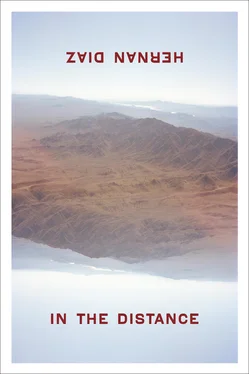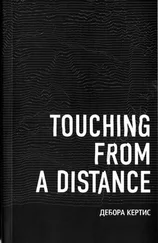As a precaution, Håkan left the horse tied down on the ground for the first two days and kept giving him a low dose of sedative. When the time came for Pingo to get up, he proved to be stronger than expected. Still, Håkan knew it would be several weeks until the horse could walk the long distances they had previously covered every day. And they were almost out of water. According to Lorimer, they were supposed to come to a river, which—given the distance already traveled—could not be too far away. Håkan left Pingo food and water in a cask buried to the rim so it would not spill, tied him to the trunk of a sturdy bush with a long cord, and, in case this should fail, fettered his forelegs with a loose rope so as to hamper his movement. Although the animal was tethered and hobbled, Håkan was reluctant to leave his horse and kept turning around to look at his immobile silhouette until it was warped and wiped out by the distant waves of heated air.
The river, a brown line of slow, muddy waters, was a mere two days away. Although the vegetation on the riverbank showed the sternness the desert demanded of all living beings, Håkan found it refreshingly green—and the burro even discovered some bunchgrass to bring back to Pingo. Hidden in the low, entangled treetops, the only haven for miles around, several bird nests brimmed with eggs, most of them a pale orange marbled with ochre streaks. Håkan ate a few and wrapped about two dozen more of different sizes and colors in a piece of cloth. He went back to the riverbank and tried to fish with suture and a curved needle but, after a long wait, only caught a small, pungent bottom-feeder. Walking up and down the shore, he made a loud crunch with every step. He scratched the sand with the tip of his shoe and found the strand to be lined with mussels that had made their shallow homes just a few inches under the surface. He pried one open and inspected the slime within. It looked more like a single organ than a body made of many parts. He dislodged the mollusk from its shell and slid it down his throat, avoiding chewing or tasting it. With little effort, he dug out a great number of mussels and then threw them into the vats, already replenished with turbid water. The sacks were packed with grass and eggs, and soon Håkan and the burro were heading back the way they had come.
Faithful, uncomplaining Pingo stood waiting by the bush, exactly where he had been left. He was thirsty but in somewhat better shape. His stitches were healing, and although he seemed more vivacious, he found walking extremely painful.
Their bivouac gradually became a permanent camping site. Håkan cleared the center of a large thicket and spread a tarpaulin over the opening, creating a low, shady shelter where he lay most of the time, stupefied by the heat. Every three days or so, he walked back to the river with the burro and brought back water, mussels, eggs, and grass, so despite the long delay, their provisions remained, for the most part, untouched. Meanwhile, Pingo’s condition seemed to be deteriorating. He got intense itching fits around his stitches. Part of his rib cage was raw after so many attempts at scratching the scar with his teeth, and he often had to be muzzled. The fits increased as he developed a swollen redness around his stitches, a hard yet somehow fragile force pushing from within. Pingo’s eyes had grown larger. When he was not dressing his wound, Håkan was coaxing him to drink water or trying to shield him from the sun. He spent most of the day with his cheek to the horse’s neck, feeling the flesh twitch under his coat. Eventually, Pingo’s legs gave in, and he lay down. His breathing was a broken rustle, as if withered leaves were rolling inside his rusty windpipe. His eyes seemed to be about to pop out. The wound acquired a life of its own—warm and mauve, taut and throbbing.
A maggot emerged from under one of the stitches the same day Pingo started hallucinating. Håkan pulled it out and saw a confusion of worms boiling within the wound. Later that day, Pingo’s ears started quivering as if they were swarming with insects. Then he began shaking his head and whipping his back with his tail, swatting invisible flies. Then he tried and failed to get up. Then he screamed. It was a sound unlike anything Håkan had ever heard. Two monstrous knife edges running against each other. Pingo sustained the scream until his lungs crumpled. Then, he screamed again. And over and over again. Håkan embraced the neck of his horse, whose delirious eyes were being sucked out of their sockets by the horizon. Pingo kept screaming, veins and tendons bulging around his throat. Håkan held him tighter and wept. The screams only stopped after a strong dose of sedative. Once Pingo was unconscious, Håkan cut through his cava and carotid, rolled up his tarp, and left.
He had not seen his own face since he had left Clangston. Only splintered reflections on blades, partial glimpses on lids, quivering images on water, or curved caricatures on glass—never a complete, truthful picture of his features. And now, there it was, lying on the desert. His face.
Walking alongside the burro, he had crossed the shallow river and kept traveling north for several days without incident. Håkan was used to the illusions the desert conjured up from the dust. He had seen many pools spring up in the distance and then dispel as he advanced toward them, many hopeful or menacing shapes gather on the horizon that were nothing but the hazy ghosts of heat. But the blinding light coming from the ground was unlike anything else, and this strangeness confirmed its reality. More than a glare, it looked like a frozen blast, a detonation suspended in its flashing climax. The sharp whiteness cut through his eyes. As he approached that silent constant explosion in the sand, Håkan realized that it was somewhat elevated, although it was hard to look at it straight on. A few moments later, he reached the blaze. It was the mirror on the open door of a massive wardrobe. The large trunk was beached on its back, disemboweled, and the open door hung from its hinges at an angle. He was impressed by the dresser’s craftsmanship—sensuous spirals and scrolls, lifelike paws and claws, plump cherubim and flowers. It was the softest surface he had touched during his long trip through the porous, pumice-like desert. Although there was something profoundly intimate about it—something conjugal—the dresser also called forth a crowded world and a sense of urban refinement Håkan could only vaguely imagine. In fact, the dresser was the most concrete embodiment of those civilized comforts he had ever been free to touch and inspect. While running his fingers over the turned black wood, Håkan’s approach to the mirror changed. The sun was no longer on the glass, and he was finally able to look into it. It took him a moment to accept the face he saw as his own. Some of his old features were gone, new ones had set in, and he had to find himself in the image at his feet. The orange shadow of a mustache hovered over his lip, and the hesitant promise of a beard spotted his chin and hollow cheeks. At the sight of his emaciation and his protruding bones, he was reminded of his teeth. With great anxiety, he parted his chapped white lips to inspect his gums. The inside of his mouth, moist and red, was the only part of his body that remained unaffected by the arid wasteland. Relieved to find his teeth as healthy as ever, he returned to that strange face that looked up at him in bewilderment. He had withered and wrinkled—the sun had burned deep crevices into his face. His eyes were permanently screwed up, but not as the result of a deliberate frown. This was just his face now, creased by the constant squint of someone facing an overwhelming light or an unsolvable problem. And his gaze, almost invisible in the narrow trench under his knit and ribbed brow, was no longer fearful or curious, but dispassionately hungry. For what, he could not tell.
Читать дальше












